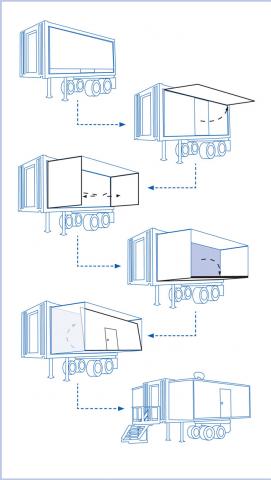Mobile forensics laboratories are an innovative and efficient way to expand or replace forensic capabilities in combat areas or regions that have experienced a natural disaster or other crisis. They were developed by the National Forensic Science Technology Center in partnership with the Department of Defense, which used similar laboratories in Iraq and Afghanistan to study improvised explosive devices.
In addition to helping agencies respond to natural disasters, the mobile forensics laboratories can be used for security training exercises.
Nuts and Bolts
- Because they are created from a standard shipping container, mobile forensics laboratories can be delivered by truck, transport plane, train, ship or helicopter, bringing laboratory support to even the most remote areas.
- Each laboratory measures 8' x 20' x 8.5' and rests on a standard transport trailer for ease of movement. Once folded out, the laboratory provides a maximum of 400 square feet of usable space, complete with lighting, wraparound power access and open floor space. Multiple laboratories can be connected to allow for different disciplines, contamination prevention, administrative areas or other uses.
- Each section is self-supporting and can be used separately for smaller projects. A diesel-powered generator offers a minimum of 33 hours of power on a single tank, providing air conditioning or heat, light satellite communications and even conditioned power for sensitive forensic equipment. Interior separators can provide dust- and light-proof work areas within each unit.
- A small team can set up the laboratory in less than an hour, not including equipment startup. Each lab features full data sharing and an access-controlled entryway.
See Mobile Forensics Laboratory Helps Cedar Rapids CSI Recover From Devastating Flood.
About This Article
This article appeared in NIJ Journal Issue 264, November 2009.



